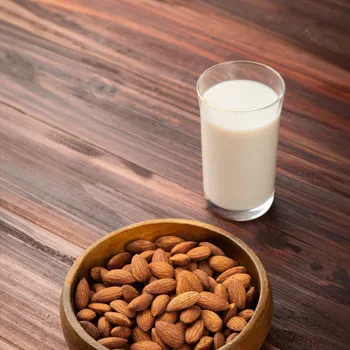Delving into the Truth About Almond Milk: A Detailed Analysis on Health, Nutrition, and Sustainability. Explore the facts!
Almond milk has become quite the popular choice in Indian households these days.
You see it everywhere, from your local kirana store stacked with Tetra Paks to fancy cafes offering almond milk lattes.

More and more people are reaching for it as a substitute for cow's milk, but is it really as healthy as it's often made out to be? Let's take a closer look and explore the facts, separating the myths from the reality.
Almond milk's popularity for health benefits, though sugar content can detract
One of the biggest reasons for almond milk's popularity is its perceived health benefits. Folks are often told that it's low in calories, free of cholesterol, and a good source of vitamin E. This is partially true. Compared to whole milk, almond milk does have fewer calories.

However, it's important to read the labels carefully. Many commercially produced almond milks have added sugars to improve the taste. These added sugars can negate some of the benefits, especially for those watching their weight or managing blood sugar levels.
The vitamin E content is definitely a plus; it’s an antioxidant that can help protect your cells from damage and keeps your skin glowing. But let's not forget that you can get vitamin E from other sources too, like almonds themselves, sunflower seeds, and spinach.
So, while almond milk can contribute to your vitamin E intake, it's not the only way. The marketing can be powerful, so staying informed is key to making the right choices for your body.
Switching to almond milk for lactose intolerance relief
Another major reason people are switching to almond milk is the issue of lactose intolerance. Many Indians experience discomfort after consuming cow's milk due to lactose, a sugar found in milk. Almond milk is naturally lactose-free, making it a welcome relief for those with this condition.

It prevents bloating, gas, and other digestive problems associated with lactose intolerance. But it's crucial to remember that lactose intolerance isn't the only reason someone might have trouble digesting cow's milk. Some people are allergic to milk proteins, like casein and whey.
Almond milk won't help with such allergies; it's not a solution for everyone. It’s crucial to understand why you feel unwell after drinking cow's milk. Is it lactose, or is it a milk protein allergy? A doctor or registered dietitian can help you figure this out.
Once you understand the root cause, you can make a more informed decision about whether almond milk is the right choice for you. Don’t self-diagnose; get proper advice!
Cow's milk is high in protein; almond milk lacks it
Now, let's address the protein question. Cow's milk is a good source of protein, which is essential for building and repairing tissues in the body. Almond milk, unfortunately, falls short in this department.

A typical serving of almond milk contains just around 1 gram of protein, compared to the 8 grams you'd get from cow's milk. This can be a significant difference, especially if you rely on milk as a major source of protein in your diet.
If you're considering switching to almond milk, it's important to find other ways to make up for this protein deficiency. Think about adding more lentils, beans, tofu, or other protein-rich foods to your meals.
Also, some brands of almond milk add extra protein, usually pea protein, so that can be an option to look out for. Read the labels carefully! It is essential to ensure they're getting enough from other foods ensuring balanced nurition is very important.
Almond milk not always equal to cow's milk nutritionally; check labels carefully
Looking at the nutritional profile in detail, almond milk isn’t a direct one-to-one substitute for cow’s milk, nutritionally. Consider the vitamins and minerals. While some almond milk brands are fortified with calcium and vitamin D to mimic the benefits of cow's milk, not all of them are.

So, again, it's super important to read the nutrition labels! Calcium is vital for strong bones and teeth, and vitamin D helps your body absorb calcium.
If you're not getting enough of these nutrients from almond milk, you'll need to find them elsewhere in your diet or consider taking supplements after consulting a doctor. Moreover, the bioavailability that means a body’s ability to absorb and use these vitamins is also something to get considered.
Sometimes, the vitamin D added in a fortified product doesn't necessarily mean it’s reaching where it should to benefit a person. Hence the recommendation is to consult a medical person.
Almond farming impacts water use; consider alternatives mindfully
From an environmental perspective, almond farming has raised some concerns about water usage, especially in drought-prone areas like California, where a large portion of the world's almonds are grown.

Producing almond milk can require more water compared to some other milk alternatives, like oat milk. However, it's worth noting that all agricultural products have an environmental impact.
Cow's milk production also has its own set of environmental concerns, including greenhouse gas emissions and land use. It boils down to understanding the complexities of agriculture and considering various factors when making informed choices.
So, if you're concerned about the environmental impact, research different milk alternatives and their production methods. You can make a decision that aligns with your values and contributes to a more sustainable food system. The world certainly needs more conscious choices.
Almond milk vs. cow's milk: budget, health, environment
Finally, let’s dive into practicality and budget. Almond milk is often pricier than cow's milk. If you're on a tight budget, it's a factor to keep in mind. You might be able to save money by making your own almond milk at home.

While it requires a bit of effort, it can be a more economical and environmentally friendly option as you control the ingredients and reduce packaging waste. Overall, the decision of whether or not to switch to almond milk depends on your individual needs, preferences, and dietary requirements.
There's no one-size-fits-all answer. Almond milk can be a healthy alternative for those who are lactose intolerant or looking to reduce their calorie intake, but it's not a perfect replacement for cow's milk in all aspects.
Weigh the pros and cons, considering factors like protein content, added sugars, vitamin and mineral fortification, environmental impact, and cost, and then make an informed choice that works best for you.
A healthy eating lifestyle ultimately comes down to educated choices and mindful consideration.
AI Generated Content. Glance/InMobi shall have no liability for the content




















